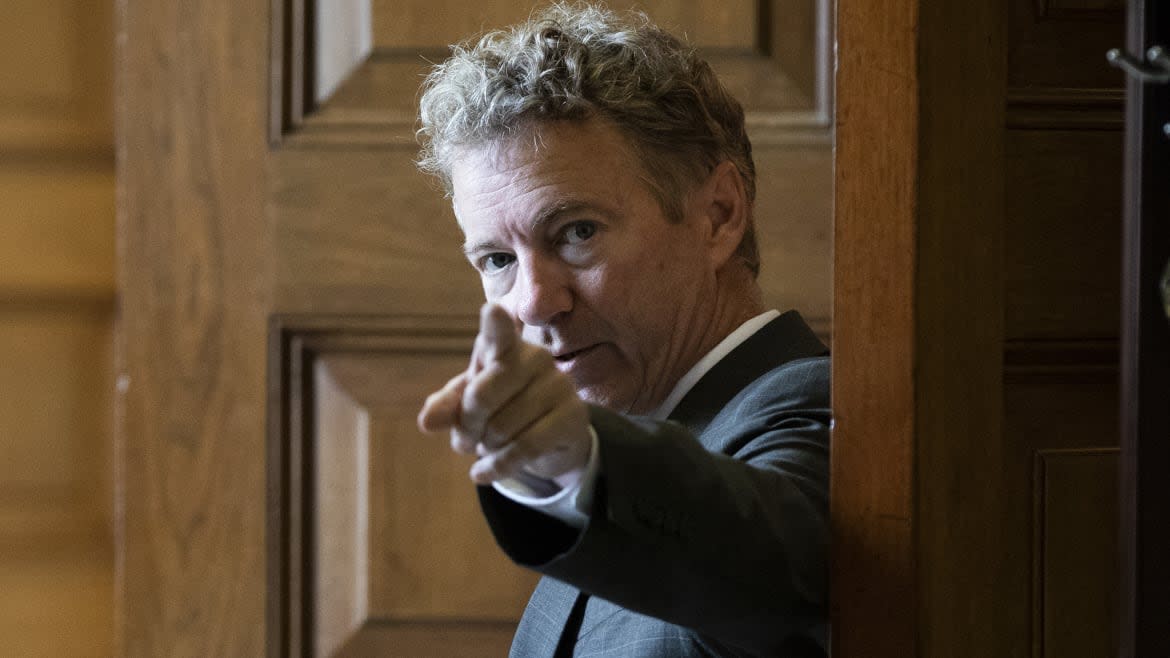Rand Paul Used to Be a Whistleblower’s Hero. Now He Wants to Out Them.

Before he publicly demanded that the media expose the identity of the anonymous Ukraine whistleblower, Sen. Rand Paul (R-KY) was literally the toast of the whistleblower advocacy world. Six years ago, the Kentucky Republican received an award for his work to protect those who come forward anonymously with allegations of wrongdoing by the powerful.
The honor was issued at the Whistleblower Summit for Civil and Human Rights—a non-partisan conference that had given their Pillar Human Rights Award to other elected officials in the past, including Sen. Chuck Grassley (R-IA). In 2013, they chose to to acknowledge Paul, among other lawmakers, for being one of a few GOP senators willing to take political flak in defense of Edward Snowden, who had just come forward with a sweeping disclosure of federal government snooping. Many of Paul’s colleagues were livid with Snowden, and though the Kentucky senator believed he deserved punishment, he maintained that the revelations were a service to the country.
In the aftermath, Paul pushed for whistleblower protections to be extended to government contractors such as Snowden. “We’ve got so many millions of government contractors that when they see something wrong, they should be able to report it without repercussions,” Paul said in an address to a libertarian conference in 2014. The following year, Paul introduced an amendment to a Senate cybersecurity bill to that effect: the legislation proposed that contractors with knowledge of surveillance programs could send formal complaints to the Government Accountability Office, the congressional Intelligence Committees, or through internal channels.
Republican Senator Rand Paul Freezes Trump Nomination Over NSA
Fast-forward nearly six years later, and the Kentuckian is singing a different tune. On Monday night, at a raucous rally featuring President Donald Trump in his home state, Paul called for the media to print the name of the anonymous whistleblower who came forward with an account of Trump’s now infamous call with the Ukrainian president—delighting the crowd and the president, who stood beside him grinning.
“We know the name of the whistleblower,” said Paul. “Do your job and print his name.” He doubled down on those comments on Tuesday back in Washington—and declared he “probably” would out the whistleblower himself. “There is no law preventing anyone from saying the name,” he told reporters.
And when asked to respond to criticism of his remarks, Paul replied with a reference to the constitutional amendment guaranteeing the right to a fair, speedy, and public trial.
"You've heard of the Constitution, right?” Paul quipped. “The Constitution has the Sixth Amendment."
The circumstances of Paul’s whistleblower advocacy in the post-Snowden period is substantively different in certain ways from than the debate currently being waged inside the Beltway. Back in 2013, the senator was arguing specifically for protections for government contractors, which the current whistleblower does not appear to be. And he didn’t make any overt mention about the right to anonymity when discussing the protections that whistleblowers deserved—a distinction that the senator seemed to allude to in a Tuesday afternoon tweet.
But tonally, Paul’s approach appears to have changed dramatically. In the amendment that he introduced, for example, there is an explicit prohibition on “professional retaliation against whistleblowers.” And when he took to the Senate floor to deliver a filibuster of the Patriot Act’s reauthorization in May 2015, he spoke of extending whistleblower statute “to people who want to come in and want to tell an authority, an investigator general or somebody, if they want to reveal that they think something is being done illegally.”
Paul is hardly the first GOP defender of the president to argue the public should know who the Trump whistleblower is. But he has certainly become one of the most—if not the most—outspoken.
The consensus position among most Trump-backing Republicans is that the Ukraine whistleblower—whose name has circulated within conservative media—is a deep state creature from the Barack Obama era who is scheming to undermine Trump. And several allies of the president on Capitol Hill, such as Sen. Lindsey Graham (R-SC), have argued that the current whistleblower process is somehow being “abused” by the anonymous intelligence community official, and leaned on that claim to justify revealing that person’s identity.
Nunes Aide Is Leaking the Ukraine Whistleblower’s Name, Sources Say
But few Republican senators were willing to echo Paul’s call for the press to out the whistleblower. Though he believes the whistleblower’s name should be public, Graham told reporters on Tuesday that it’s not the media’s job to do it.
“I think we should allow the president to know who his accuser is,” he said, “and I think the whistleblower statute is being terribly abused here.”
Other GOP senators stuck to the position that the president should have the chance to “face his accuser,” but stopped short of saying the broader public should know exactly who the whistleblower is.
It was left to lawmakers such as Sens. Susan Collins (R-ME) and Mitt Romney (R-UT) to declare that the media should not report the name of the whistleblower. Collins said it is “contrary to the intent of the whistleblower law for his identity to be revealed.”
While Paul has adopted a seemingly more skeptical position on whistleblowers, Trump has apparently mellowed out from his past viewpoints. Back in 2013, Trump not only called Snowden a “bad guy,” he floated the idea of executing him.
“You know, there’s still a thing called execution,” Trump said. “You really have to take a strong… You have thousands of people with access to material like this. We’re not going to have a country any longer.”
-- with reporting by Sam Stein
Get our top stories in your inbox every day. Sign up now!
Daily Beast Membership: Beast Inside goes deeper on the stories that matter to you. Learn more.

